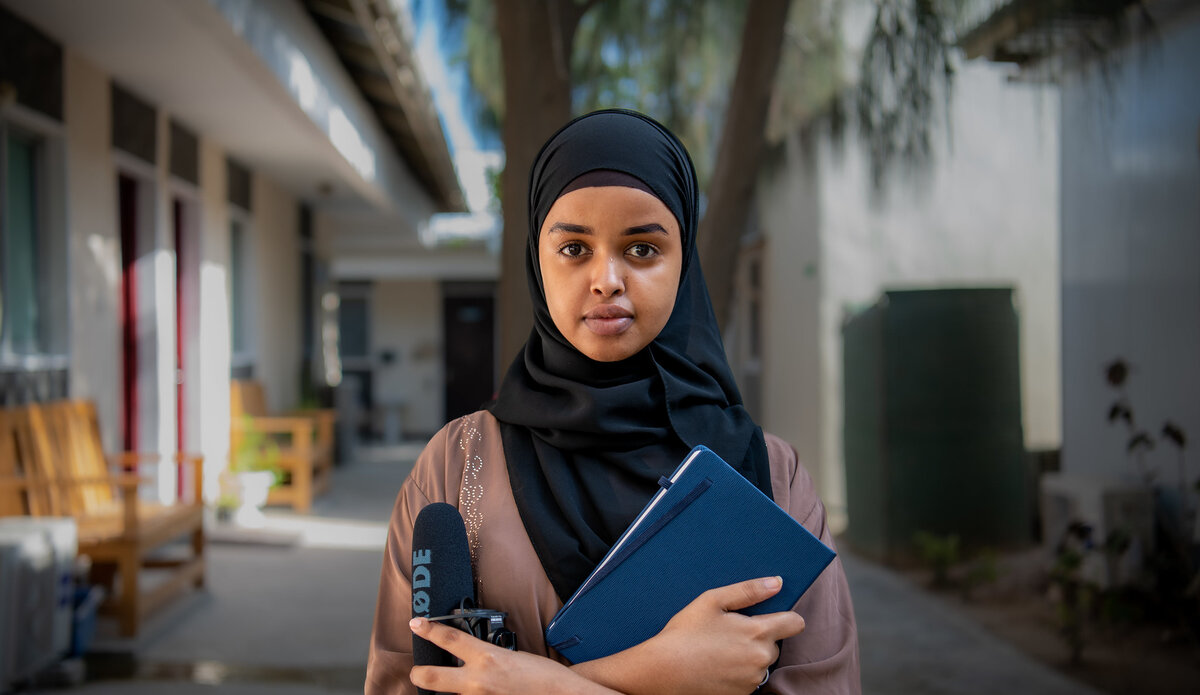Photo Story – An aspiring young Somali journalist UNcovers the world of international communications
Mogadishu — The International Day of the Girl Child was recently marked around the world with the aim of promoting girls’ empowerment and the recognition of their leadership potential.
As part of the UN family’s observance of the Day, an 18-year-old Somali with aspirations of becoming a journalist – Sabrina Ali Mohammed – spent the day at the Mogadishu-based offices of the United Nations Assistance Mission in Somalia (UNSOM), where she shadowed a senior communications official.
Ms. Mohammed’s experience at UNSOM provided her with a glimpse into the world of international communications and the diverse ways in which the UN supports peace and development in Somalia. She met with some of the UN's top officials in the country, who shared their insights and advice on working for the UN and, more broadly, pursuing her dreams.
Here is a snapshot of Ms. Mohammed’s day at UNSOM, captured in photos:
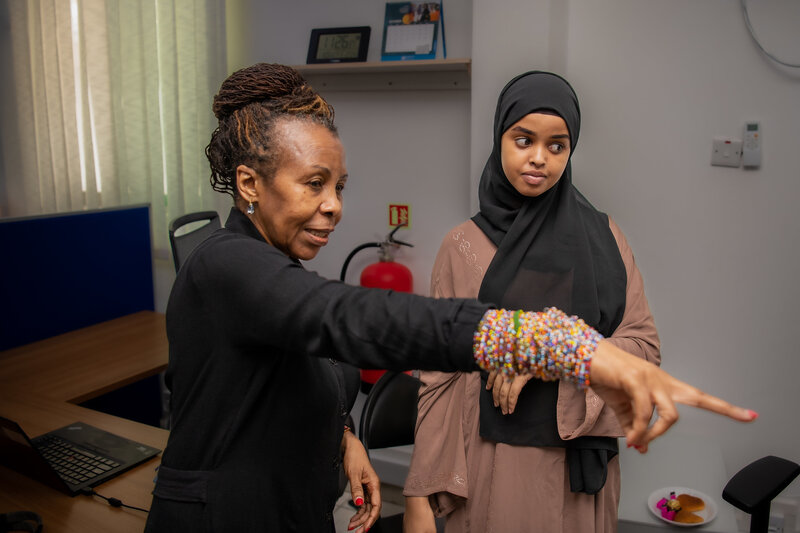
09:00 a.m. – Ms. Mohammed starts her day meeting with Valerie Msoka, the Deputy Chief of UNSOM’s Strategic Communications and Public Affairs Group (SCPAG).
Ms. Msoka briefs her on the role and functions of SCPAG, which include carrying out long-term communications campaigns, producing multimedia content, managing social media platforms, organising outreach activities, and liaising with the media.
The programme for Ms. Mohammed involves her following Ms. Msoka as she goes about her work. A Tanzanian national with more than 30 years of experience in international journalism and communications, the veteran Ms. Msoka provides tips on crafting compelling stories.
“In the world of journalism, you have to dig deeper to find the truth,” she says. “You have to challenge assumptions, question sources and verify facts. You have to be curious, courageous and committed. Journalism is not just a profession; it is a public service.”
Ms. Msoka also emphasises the vital role that education can have in transforming the lives of young women and girls – it did this for her, and she is motivated by the possibility of it having the same effect for Somali girls.
“Education is the most powerful weapon to transform the world,” the UN official says. “It empowers girls to become agents of change and advocates for their rights. It enables them to break the cycle of poverty, violence, and discrimination. It gives them hope, confidence, and dignity.”
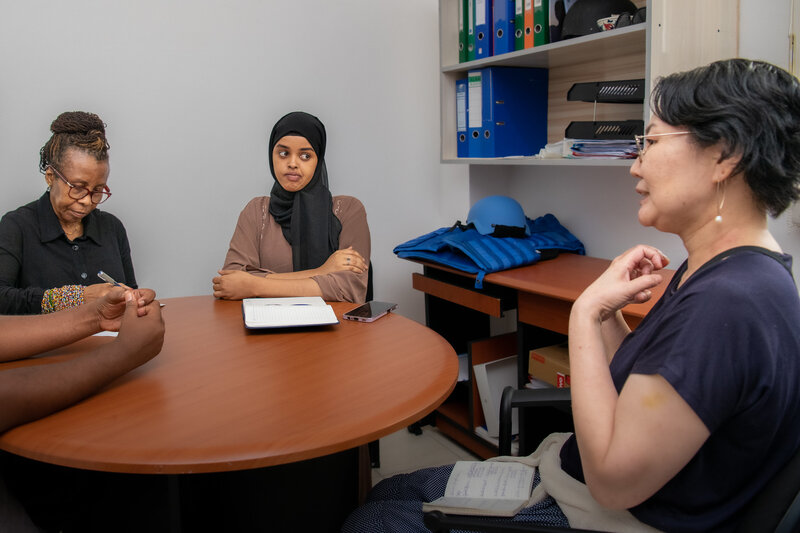
09:45 a.m. – Ms. Mohammed accompanies Ms. Msoka to her first meeting of the day – with Rei Shigeno, a Japanese national serving as UNSOM’s Acting Chief of Staff.
The Chief of Staff's office coordinates and supports the work of different sections and units within UNSOM, as well as with other UN entities and national and international partners in Somalia. After her initial discussion with Ms. Msoka on work matters, Ms. Shigeno spends some time asking about Ms. Mohammed’s ambitions.
Ms. Shigeno began her working life as a university lecturer, after graduating from university with a degree in philosophy. Ms. Mohammed is curious as to how she ended up working for the UN with her area of study.
"I think what I have learned the most given my academic background is to not look at the obvious,” Ms. Sheigeno tells her, “but to look behind the scenes to understand more deeply what is happening. And read between the lines, not at the obvious."
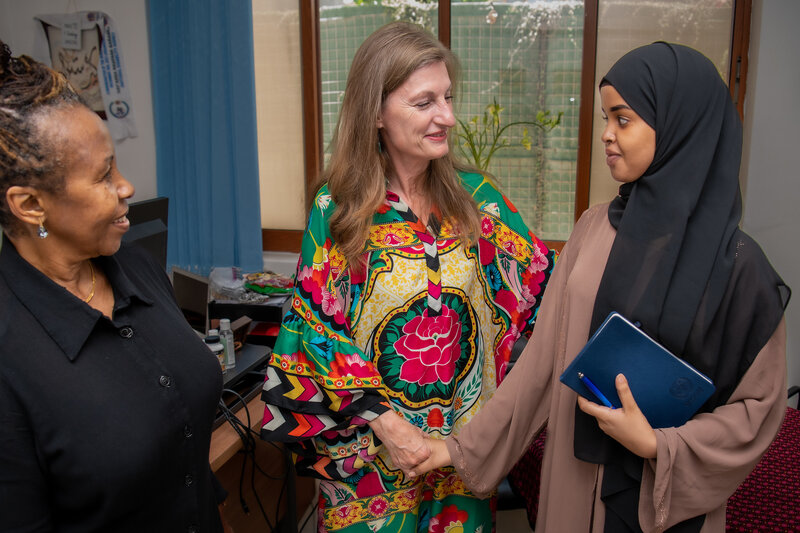
10:15 a.m. – Ms. Msoka’s next meeting is with colleagues from UNSOM’s Human Rights and Protection Group. There, from senior and junior staff, both Somali and international, Ms. Mohammed learns about the Group’s activities, which include monitoring, documenting, and reporting on human rights violations and abuses in Somalia, as well as providing technical assistance and capacity-building to national institutions and civil society.
Ms. Mohammed’s career ambitions figured in the discussions, with some of the UN human rights staff emphasising the vital role of journalists in protecting and promoting human rights.
"Often our first source of information about an incident is from the media, and our media colleagues often notify us of incidents before they hit the mainstream media – they are a very important source of information for us," noted one of the Somali Human Rights Officers in their chat with Ms. Mohammed.
In her exchange with the young student, the Chief of the Human Rights and Protection Group, Kirsten Young, flags how journalism influenced her own career choices.
"Among others, there have been two female war reporters who inspired me to start working in human rights. They brought a very human perspective to how conflict had been historically reported and showed how vital it is to get the voices of those most affected heard," says Ms. Young, who also serves as the Representative of the Office of the UN High Commissioner for Human Rights (OHCHR) to Somalia.
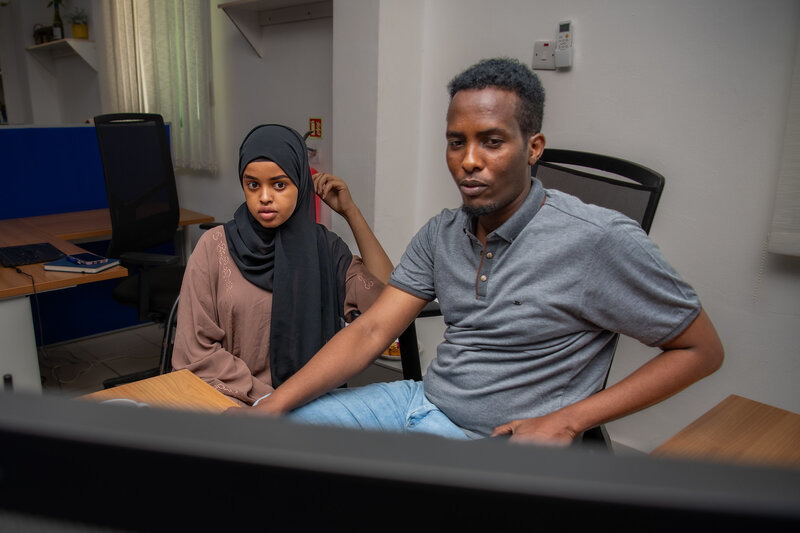
11:00 a.m. – For an aspiring journalist, Ms. Mohammed has lucked out in landing with SCPAG for her day at the United Nations – the 15 staff members of SCPAG have an accumulated 225 years of experience in all facets of journalism and communications!
Back at SCPAG’s office, Ms. Mohammed receives a master class in feature writing from SCPAG's Somali staff members, most of whom are former journalists and writers dedicated to sharing the stories of Somalia’s people and progress with the world.
"Effective storytelling allows us to demonstrate the resilience and perseverance of Somalis to a global audience," Ahmed Weli Hussein Mohamud, a Public Information Officer, tells Ms. Mohammed, after explaining the ins and outs of writing engaging feature stories.
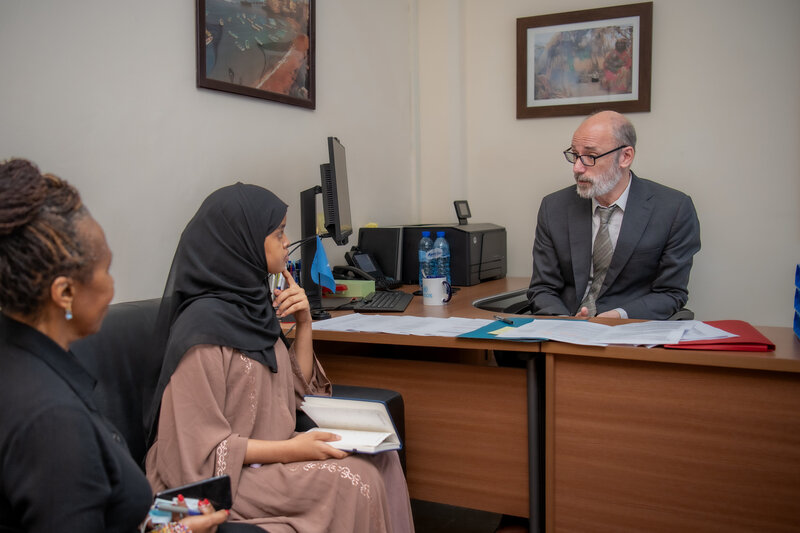
12:00 p.m. – Ms. Msoka has a meeting with one of the UN Secretary-General’s Deputy Special Representatives for Somalia, George Conway, who also serves as the UN Resident and Humanitarian Coordinator for Somalia. Top of their discussion list is an upcoming press conference which Mr. Conway will take part in.
A Canadian national, he has more than 20 years of experience in development, crisis prevention and recovery, and humanitarian affairs with the United Nations, with service in Indonesia and South Sudan, in addition to Somalia and UN Headquarters in New York City.
Learning about Ms. Mohammed’s goals, Mr. Conway reflects on his journey to and with the world body.
“I followed closely the impact of the UN in a post-conflict country and how the work of the UN supported the people in state building and peacebuilding – I really wanted to be part of this work. Today, I get to live that purpose in Somalia, working with the Somali government and Somali people on building a better Somalia for all," he says.
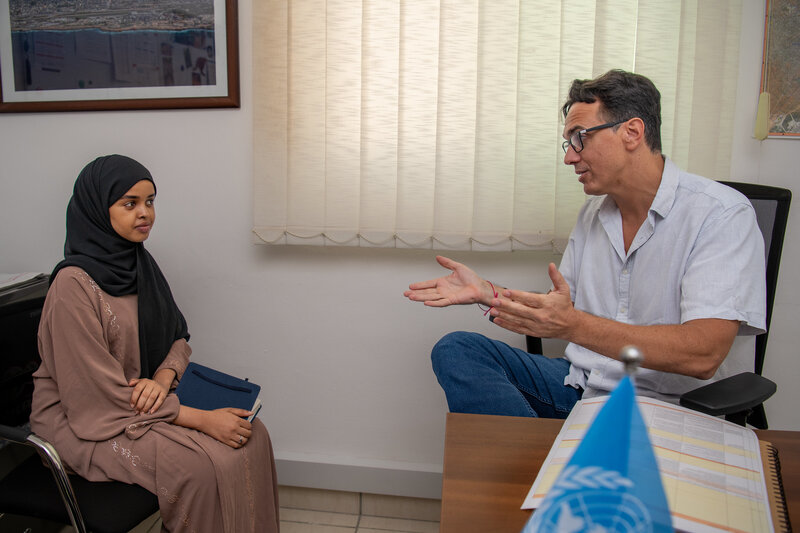
12:20 p.m. – Ms. Msoka drops in on SCPAG’s Chief and UNSOM’s Spokesperson, Ari Gaitanis, also a UN veteran and a former journalist, to catch up on a range of topics – and to introduce Ms. Mohammed. An Australian national, Mr. Gaitanis is heartened to hear of Ms. Mohammed’s journalistic goals.
“Whether it’s for a news outlet or for an international organisation – the fundamentals of story-telling remain the same: crafting narratives that inform, engage and inspire people,” Mr. Gaitanis tells her.
When hearing about her long-term goals, Mr. Gaitanis is clear.
“Journalism is a tough field to enter, but it’s a worthy one. There will be obstacles and hurdles, there’ll be days you may wonder if all the hard work and sacrifice is worth it, and it is,” he adds. “Telling stories that illuminate and inform is an important role in any society.”
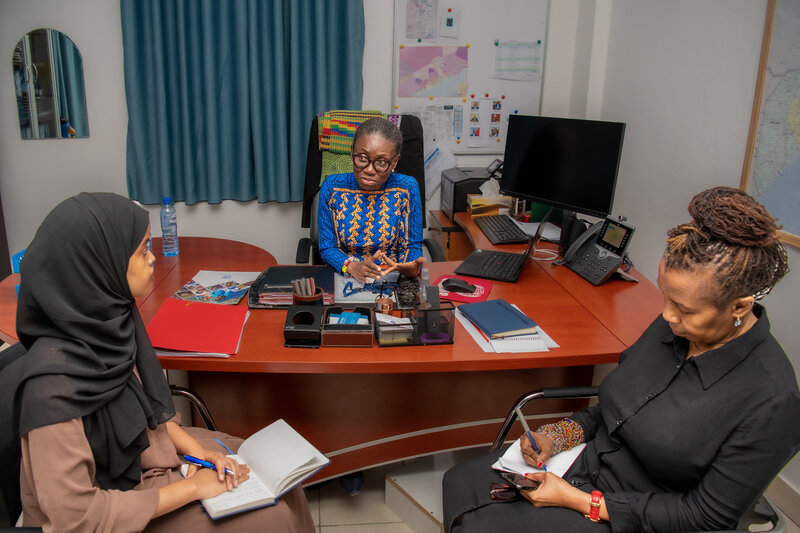
01:30 p.m. – Ms. Msoka’s schedule takes her – and Ms. Mohammed – to a meeting with the UN Secretary-General’s other Deputy Special Representative for Somalia, Anita Kiki Gbeho. A Ghanian national, Ms. Gbeho oversees the work of UNSOM’s political, human rights, electoral, and rule of law and security activities.
An experienced senior official, Ms. Gbeho’s UN career has involved working in political, development and humanitarian affairs at UN Headquarters in New York City and in field operations, with the latter including conflict and post-conflict environments and diverse settings such as Angola, Cambodia, Iraq, Namibia and Sudan, in addition to Somalia.
After her discussion with Ms. Msoka, Ms. Gbeho chats with Ms, Mohammed, offering her advice and encouragement: “Be prepared, dare to be different and put people at the centre of her work.”
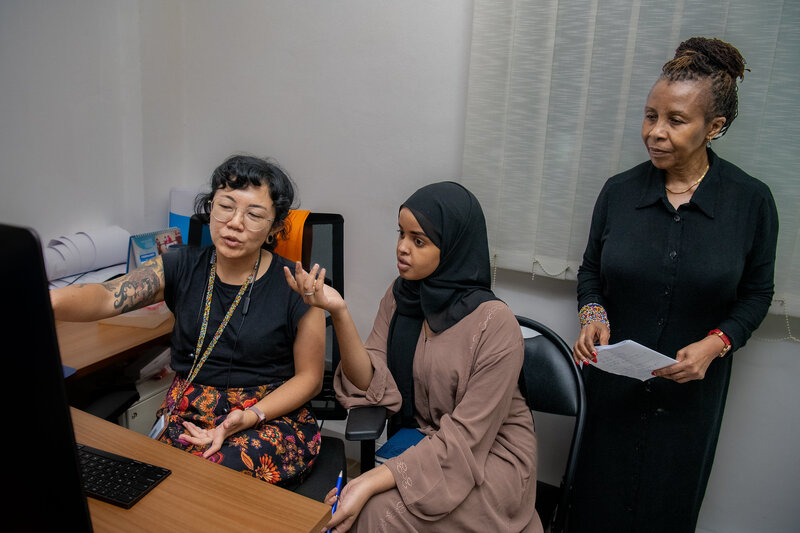
02:00 p.m. – Ms. Msoka is back at her desk, working on reports and responding to emails.
Meanwhile, there’s another master class in store for Ms. Mohammed. Ligia Kanashiro, a Brazilian national and SCPAG’s digital media specialist, shows Ms. Mohammed how to create visually appealing graphics for social media and other platforms. They also discuss the importance of using colours, fonts, images and icons which appeal to audiences and which support any messaging goals.
"Visual elements play a crucial role in conveying the message effectively," Ms. Kanashiro explains after showing examples of recent social media graphics on her computer screen.
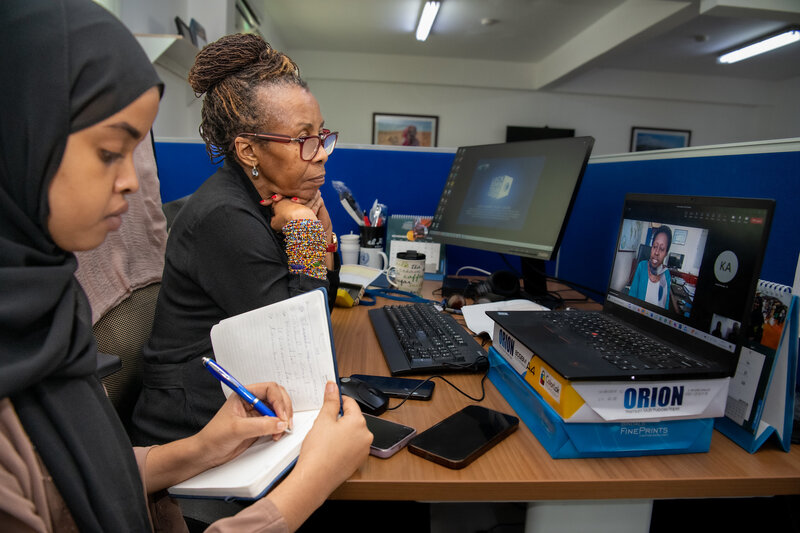
03:20 p.m. – The last meeting on Ms. Msoka’s schedule is an online encounter with Assistant Secretary-General Aisa Kacyira, who serves as the Head of the United Nations Support Office in Somalia (UNSOS).
A Rwandan national who once served as the mayor of Kigali, Ms. Kacyira leads UNSOS in providing logistical, administrative, and technical support to the African Union Transmission Mission in Somalia (ATMIS), Somali security forces, UNSOM and other UN entities operating in Somalia.
The UNSOS official was impressed by Ms. Mohammed’s commitment to her dreams, as well as that of all Somali girls.
“I believe that we have a story to celebrate in Somalia, despite the challenges we face every day. It is inspiring that you, young Sabrina, have a beautiful dream that you are already pursuing, and that you will achieve, maybe even much more than you think,” Ms. Kacyira says.
“I want to congratulate you and indeed all the girls and women in Somalia, because the international community may come and give support,” she continues. “But in the end, what matters is your will, your willingness to take the step, your willingness to take full charge and to own it and not take it for granted.”
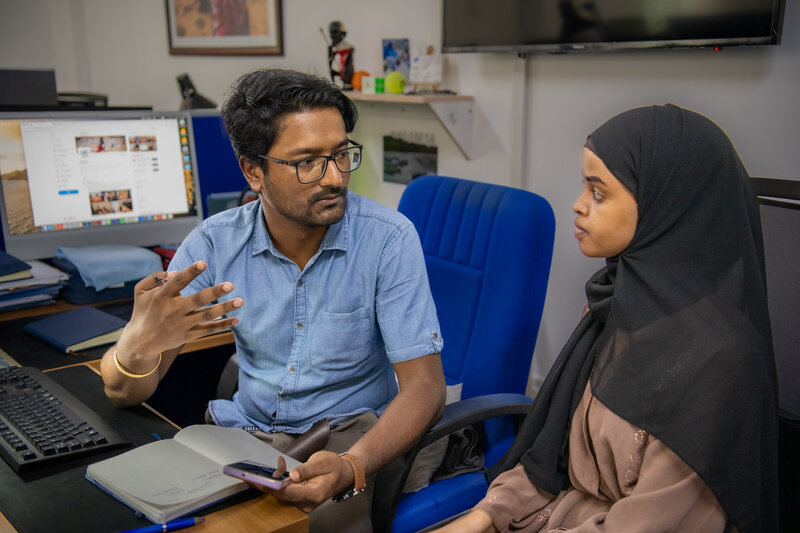
03:45 p.m. – With Ms. Msoka back at her desk, Ms. Mohammed has time to squeeze in one more master class from one of SCPAG’s experts – this time from Sourav Sarker, a Bangladeshi national who serves as a digital media producer with SCPAG. He explains some of the best practices and strategies for using social media with a long-term goal, and how to build a strong and engaged social media presence.
“Using social media is not just for fun anymore. You can enjoy the fun elements, of course, but if you plan ahead, you can also use these platforms to launch a career as a freelance mobile journalist in the next few years,” Mr. Sarker notes.
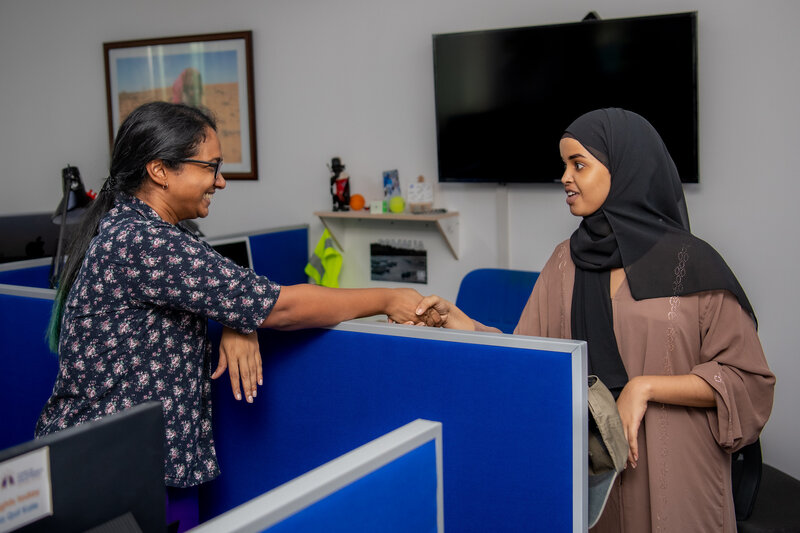
04:30 p.m. – The International Day of the Girl Child is winding up – and so is Ms. Mohammed’s day at UNSOM’s strategic communications office. The day has been long and tiring, but Ms. Mohammed’s energy levels remain high.
"Today was one of the best days of my life. I met some fascinating people and listened to their stories. I never imagined I would have such an opportunity. My passion for journalism has grown stronger, and I have gained so much insight into the UN and its work for the Somali people, especially women and girls,” she says.
“I had the opportunity to visit the UN Compound in Mogadishu and meet some of the leaders of UNSOM. I was amazed by the contrast between what I had imagined and what I saw. Instead of a scary place full of troops, Halane was a peaceful and beautiful place with good people. I entered the UNSOM compound as a curious young girl, and I left with a lot of inspiration and knowledge.
But there was one aspect of the day which particularly resonated with the aspiring journalist.
“I was especially impressed by the women leaders that I met, who shared their stories with me,” Ms. Mohammed says. “They told me about their challenges, their achievements, and their dreams. They were very happy and supportive, and I felt a strong connection with them. I am very grateful for this rare opportunity; you have given me a glimpse of the opportunities in the future and I hope to visit again soon!”
 UN
UN
